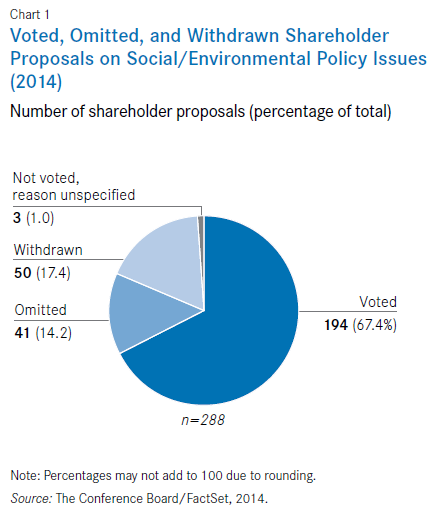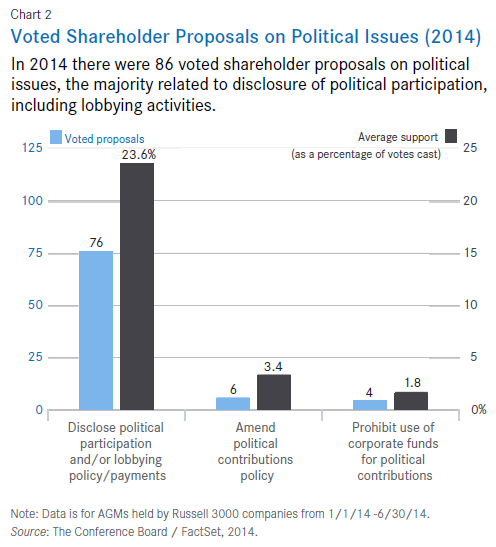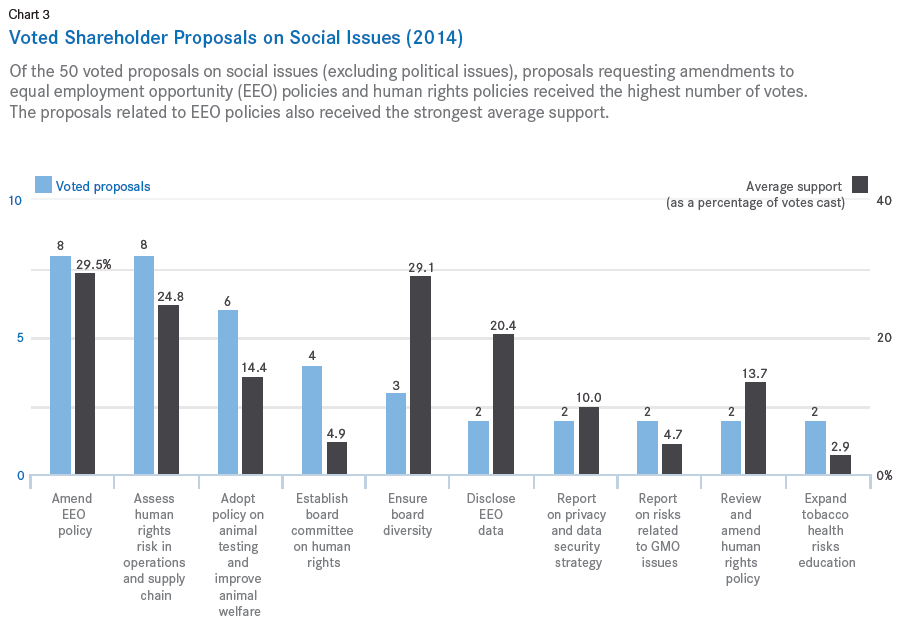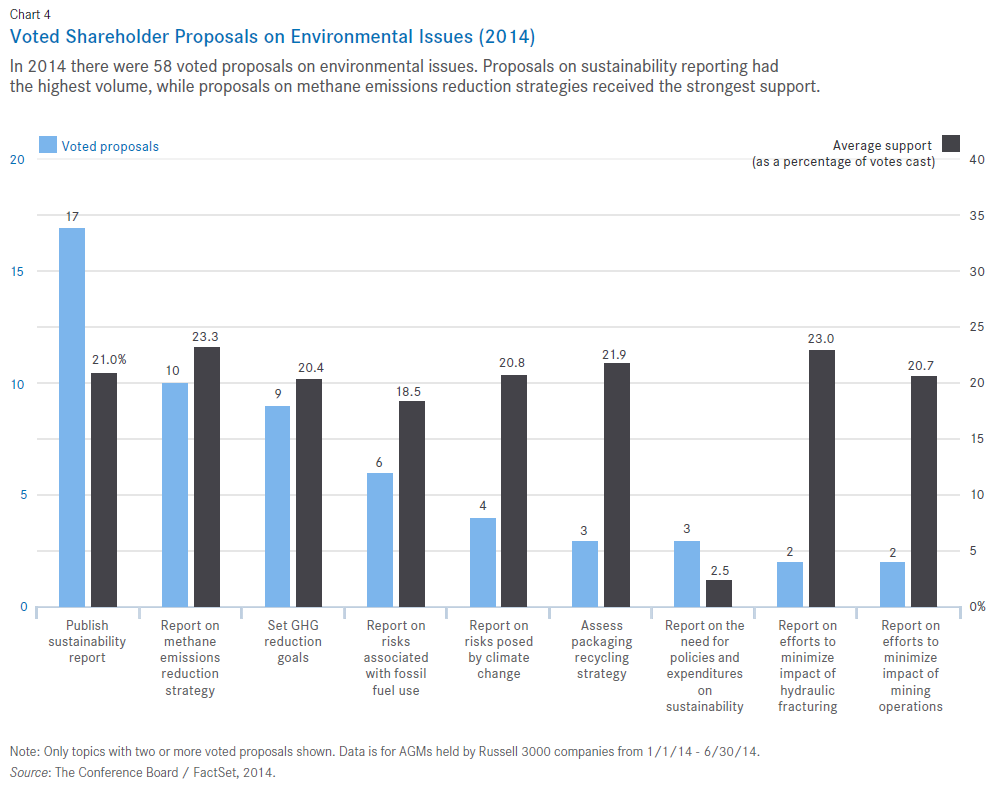Matteo Tonello is managing director of corporate leadership at The Conference Board. This post relates to an issue of The Conference Board’s Director Notes series authored by Melissa Aguilar and Thomas Singer. The complete publication, including footnotes, is available here.
Political spending and climate change, key topics during the 2014 proxy season, are expected to feature heavily again in 2015 shareholder proposals. This post reviews the content of the social and environmental proposals voted on most frequently by shareholders of Russell 3000 companies during the 2014 season, including the topics that received the highest average shareholder support. The complete publication provides examples of proposal text and sponsor supporting statements, as well as board responses and related corporate disclosure.
Nearly 40 percent of all shareholder proposals submitted at Russell 3000 companies that held meetings during the first half of 2014 were related to social and environmental policy issues, up from 29.2 percent in 2010, as documented in Proxy Voting Analytics (2010-2014). Social and environmental policy proposals now represent the second-largest category of the subjects in terms of both the number submitted and the number voted, narrowly behind corporate governance.
For AGMs held between January 1 and June 30, 2014, shareholders submitted 288 proposals related to social/environmental policy issues, 194 of which went to a vote, constituting 38.4 percent of shareholder proposals voted during the January–June period. By comparison, shareholders submitted 291 governance-related proposals to Russell 3000 companies with AGMs during the same period, of which 206 went to a vote. This report focuses on the results for the social and environmental proposals that went to a vote by June 30, 2014. Additional details, including the text of sample proposals, are provided for the issues most frequently voted on by shareholders.
The topics covered are widely diversified, ranging from disclosure of political contributions to compliance with human rights, to the adoption of a climate change policy. These proposals are pursued by multiple investor types, with the highest volume for AGMs during the first half of 2014 submitted by individuals, public pension funds, and other stakeholders, such as the Humane Society of the United States and the National Center for Public Policy Research.
However, proposals related to social and environmental policy received, on average, support of just 19.5 percent of votes cast. They also report the highest levels of abstention from voting (10.9 percent of votes cast, compared to an average abstention for the other subjects ranging from 1 to 2.5 percent) and the highest levels of nonvotes (11.3 percent of shares outstanding). This finding indicates that US shareholders, in general, continue to believe that the board of directors and senior management are better suited to determine the business viability of certain sustainability activities, and that one-size-fits-all policies may lead to inefficiencies or capital misallocations.
Top Issues
Not surprisingly, during the 2014 proxy season the vast majority of social proposals related to corporate political activities. As shown in Chart 2, 86 political issues proposals were voted on during the January–June period, representing 63.2 percent of all social proposals that went to a shareholder vote. By comparison, there were 78 voted during the same period in 2013 and 36 in 2010. In 2014, the vast majority of such proposals (76) sought disclosure of corporate political spending or lobbying policies and payments, while six sought to amend the corporate policy on political contributions, and four sought to bar outright the use of corporate funds for political contributions.
In terms of shareholder support, disclosure proposals fared the best, with an average of 23.6 percent of for votes cast, while average support for the proposals to amend corporate policies was less than 4 percent of votes cast, and less than 2 percent for those seeking to ban political spending/ lobbying.
Beyond political issues, the two most frequently voted social issues proposals during the period were those seeking the amendment of equal employment opportunity (EEO) policies and those seeking an assessment of human rights risk in operations and the supply chain (eight voted proposals each) (see Chart 3). Overall support was highest for proposals to amend EEO policies—on average, 29.5 percent of votes cast. Proposals to assess human rights risk received, on average, 24.8 percent of votes cast. Average support was slightly higher for proposals seeking to ensure board diversity (29.1 percent of votes cast) but only three went to a vote during the period.
During the same period, shareholders voted on 58 proposals related to environmental issues. Proposals seeking some sort of sustainability report were most frequently voted (17 proposals, up from 15 in 2013 and 16 in 2010), followed by proposals related to methane emissions reduction strategies (10 proposals). The highest levels of support were recorded for proposals related to methane emissions reduction strategies (on average, 23.3 percent of votes cast), and proposals seeking to assess the impact of hydraulic fracturing (23.0 percent on average for the two voted proposals). Three proposals related to packaging recycling received average support of 21.9 percent of votes cast.
The complete publication is available here.
 Print
Print



